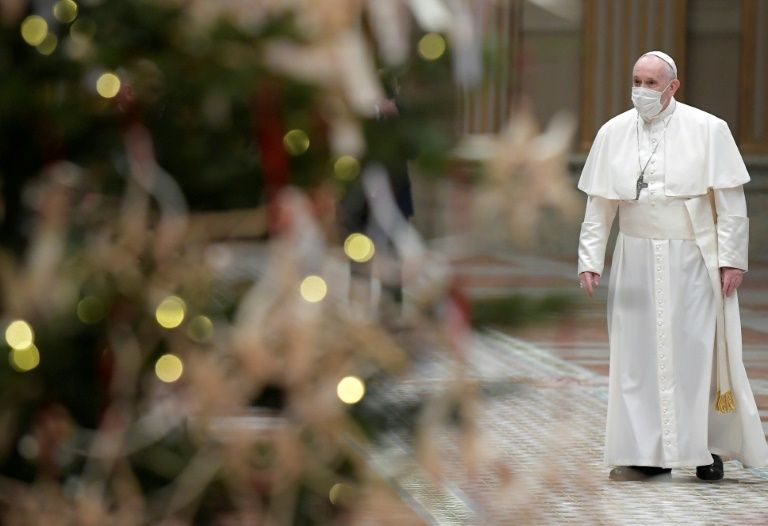Christmas celebrated under pandemic’s shadow
The pontiff, who just celebrated his 84th birthday, gave his eighth Christmas message “to the city and the world” by video from the apostolic palace, to prevent a crowd from gathering in St Peter’s Square.
The battle to halt the pandemic, which has claimed more than 1.7 million lives, is far from over despite the launching of mass vaccine campaigns.
World Health Organization chief Tedros Adhanom Ghebreyesus said in a video message that “vaccines are offering the world a way out of this tragedy” but one that will “take time”.
Tedros hailed the “heart-wrenching sacrifices” millions were making by staying away from loved ones on Christmas Day, adding that “we must not squander their sacrifices” as he called for people to keep up infection control measures.
Europe, where a new strain of coronavirus believed to spread much faster has emerged in Britain, on Friday passed 25 million confirmed cases.
Last week it became the first global region where more than 500,000 people have died of the virus.
In Asia, churches across South Korea stood largely empty, with worshippers congregating online as the country reported a new daily caseload record.
“It really is heartbreaking to see,” said Park Jae-woo, a member of the Yoido Full Gospel Church in Seoul which would usually expect up to 10,000 worshippers, but on Friday was only able to welcome 15 staff and choir members.
And in Catholic-majority Philippines, services were rocked when a 6.3-magnitude earthquake struck the country, capping off a troubled yuletide already muted by bans on parties and carol singing.
“Sad, very sad. Seeing everyone in masks, even the priest and altar servers, reminded me that the world as I know it is not the same,” said Manila resident Kyen Quimpo Mallonga after watching Christmas Eve mass on television instead of attending her local church.
Despite warm weather, the usual picnicking crowds also avoided the sands of Sydney’s Bondi Beach, while the waves were empty of surfing Santas and patrolling police officers enforced social distancing rules.
Tough new coronavirus restrictions were imposed on Thursday over the Christmas and New Year period across Italy, the hardes-hit European country, with nearly 71,000 deaths and more than two million cases.
– Thin crowds in Bethlehem –
Bethlehem, where Christians believe Jesus was born, prepared for a Christmas unlike any in its recent history.
Christmas Eve mass at the Church of the Nativity is traditionally the highlight of a holiday season that sees hundreds of thousands of visitors flock to the Palestinian city in the occupied West Bank.
The service was held online this year, with only clergy and select individuals allowed inside the basilica, which was sterilised ahead of the service.
“Everyone feels darkened, tired, exhausted, oppressed for too long under the heavy burden of this pandemic that besieges our lives,” said the Latin Patriarch of Jerusalem, Pierbattista Pizzaballa.
In war-ravaged northeast Syria, hundreds of residents of a predominantly Christian neighbourhood in the town of Qamishli ditched face masks and donned Santa hats, throwing caution to the wind to celebrate a Christmas tree lighting ceremony.
“We were concerned celebrations would be cancelled this year due to the novel coronavirus, but as you can see everyone is here celebrating and we are happy,” said Maria Danhou, a 36-year-old mother of two.
– Holiday isolation –
Germany has been forced to cancel its famous Christmas markets, while in Kuwait, churches were closed until January 10 despite being home to a large Christian community.
For many, the isolation that has defined the past year will continue into Christmas Day and beyond — such as in Belgium, where residents are largely limited to welcoming a single visitor.
Britons, meanwhile, were cut off from swathes of the world due to the emergence of a new Covid-19 strain.
Some UK border restrictions have been temporarily relaxed for the holidays, but thousands from other European countries are still stranded in England.
“Home for Christmas? Forget it,” said Laurent Beghin, a French truck driver who delivered his cargo but was still stuck days later.
However more than 1,000 waiting trucks did arrive at the French port of Calais on Friday as authorities scrambled to ease the bottleneck.
burs-tgb/dl
Disclaimer: Validity of the above story is for 7 Days from original date of publishing. Source: AFP.


